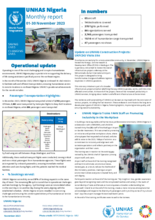UN Humanitarian Air Service
- 28,000-PLUS
- passengers transported per month
- 389
- destinations available to wider humanitarian community
The United Nations Humanitarian Air Service (UNHAS), managed by the World Food Programme (WFP), offers safe, reliable, cost-efficient and effective passenger and light cargo transport for the wider humanitarian community to and from areas of crisis. It is the only humanitarian air service that gives equal access to all humanitarian entities.
UNHAS responds to the need for access to the world's most remote and challenging locations, often under precarious security conditions, where no safe surface transport or other viable commercial aviation options are available.
Sometimes disasters – such as an earthquake in Haiti or Cyclone Batsirai in Madagascar – leave air transport as the only mean of access. At other times, it is conflict that puts entire areas beyond the reach of land transport or commercial flights.
On average, UNHAS transports more than 28,000 passengers and about 295 metric tons of light cargo per month, such as medical supplies and equipment to 275 regular and ad hoc destinations, and 114 ad hoc destinations.
To fulfil its mission, UNHAS uses a fleet of nearly 140 aircraft, including helicopters, chartered from commercial air operators that are compliant with the International Civil Aviation Organization Standards and Recommended Practices, and the United Nations Aviation Standards for Peacekeeping and Humanitarian Air Transport Operations.
How to access UNHAS
In focus
For Burkina Faso’s cut-off communities, WFP food airlifts can be lifesavers
Story | 30 May 2024
UNHAS: An airborne lifeline amid roadblocks and climate shocks in southern Africa
Story | 19 February 2024
UNHAS at 20: Humanitarian response planes and helicopters touch down in tough places
Story | 16 February 2024





